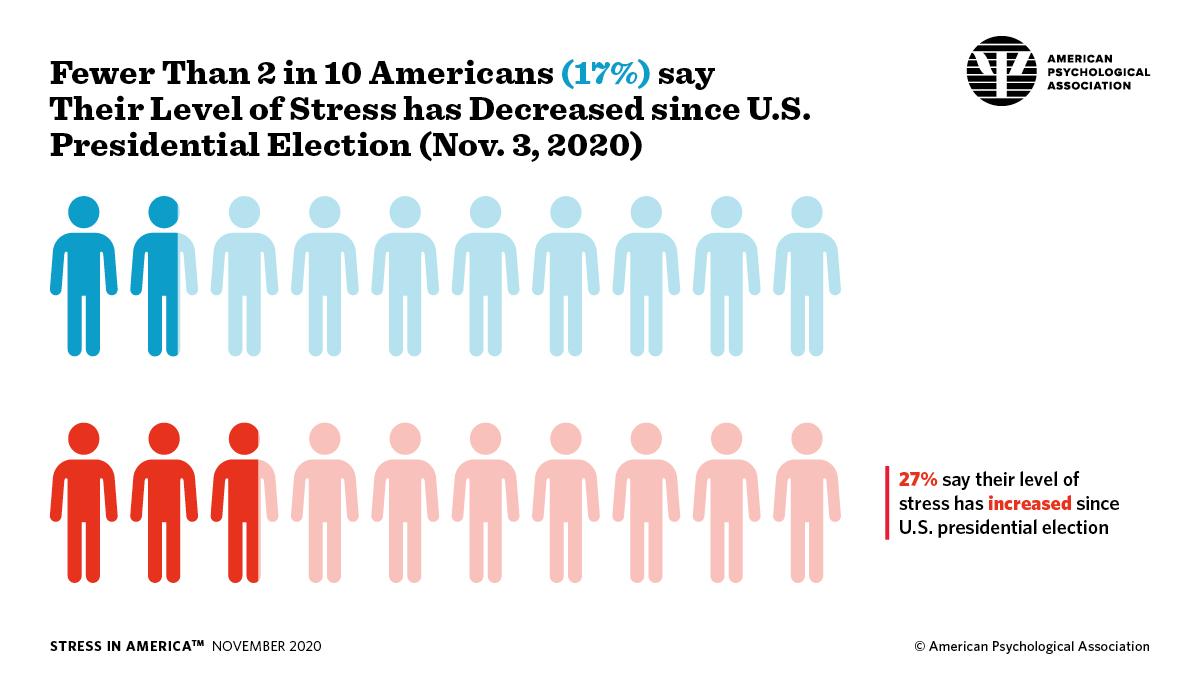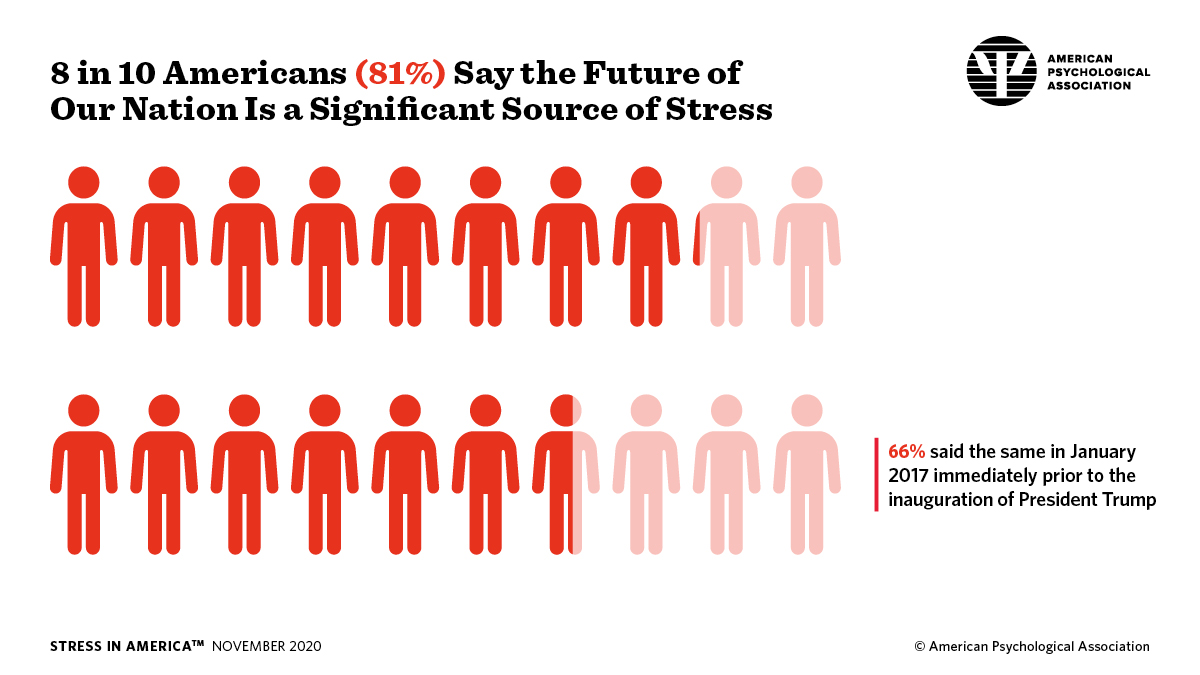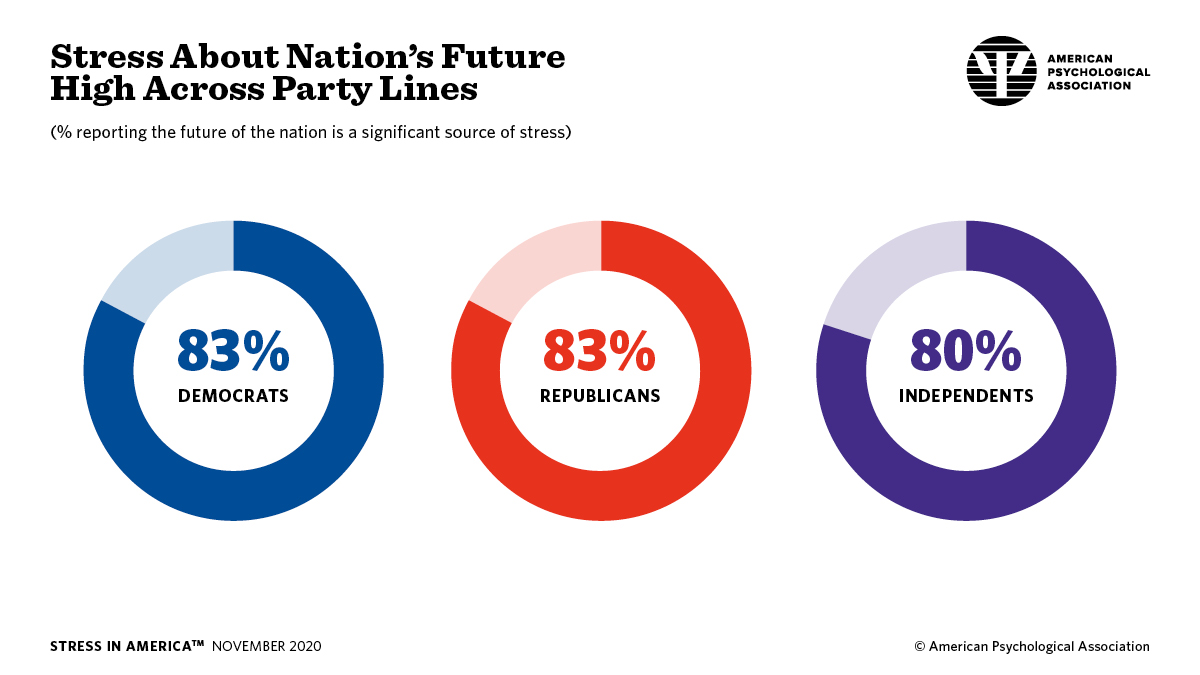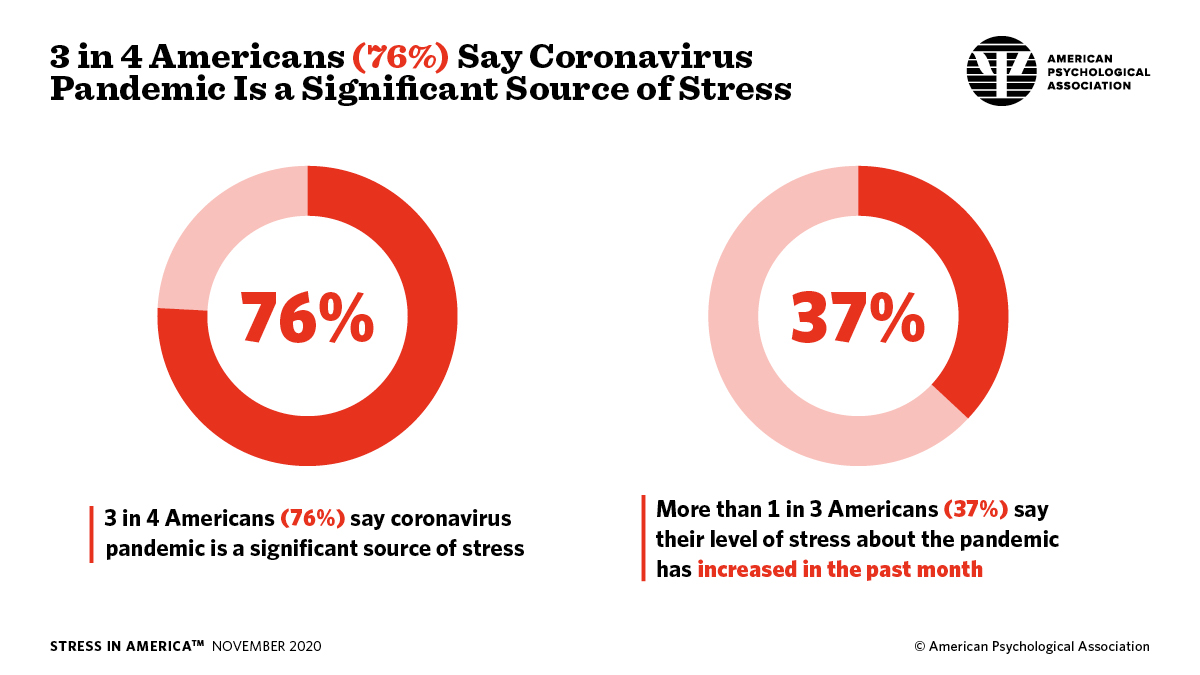OUTCOME OF PRESIDENTIAL ELECTION OFFERS LITTLE STRESS RELIEF, ACCORDING TO NEW SURVEY
APA raises mental, physical health concerns over stress as nation heads into winter
WASHINGTON — Following the most divisive election in decades, just 17% of American adults say their level of stress has decreased since Election Day, while more than a quarter (27%) say their stress has increased, according to a new survey conducted by The Harris Poll on behalf of the American Psychological Association.

When asked about specific stressors, a majority of Americans report the future of the nation, the coronavirus pandemic, the current political climate, and the outcome of the 2020 U.S. presidential election as significant sources of stress in their lives — highlighting the compounding stressors Americans continue to grapple with in 2020.
Following the 2020 election, 81% of Americans point to the future of our nation as a significant source of stress. For comparison, only 66% said the same in January 2017*. Stress about the future is high across party affiliation. More than 8 in 10 Democrats (83%), Republicans (83%), and independents (80%) say the future of our nation is a significant source of stress. When looking at the outcome of the 2020 presidential election, 71% of Americans say it’s a significant source of stress, compared with 49% who said the same in 2017. By party affiliation, 77% of Republicans cite the outcome as a significant source of stress, along with 74% of Democrats and 65% of independents.


The current political climate is a significant source of stress for 3 in 4 Americans (75%), compared with 57% of Americans who said the same in January 2017. Americans are also worried about the transition of power, with 64% saying they’re stressed about the possibility of the presidential transition of power not being peaceful. Broken down by party affiliation, 76% of Democrats share this sentiment, compared with 55% of Republicans and 59% of independents.
More than 3 in 4 Americans (76%) say the coronavirus pandemic is a significant source of stress in their lives. And over the past month, more than a third (37%) say the level of stress they feel about the coronavirus pandemic has increased. Women are more likely than men to cite the pandemic as a source of stress (80% of women compared with 73% of men). Additionally, 79% of adults in urban areas say the coronavirus is a significant source of stress, compared with 76% in suburban areas and 72% in rural areas.

“There is no doubt that we continue to face significant challenges in 2020, from the election to the pandemic. These findings demonstrate that we are not doing enough as a country to bring our stress under control, which means we are going to be less effective in our various personal and professional roles,” said Arthur C. Evans Jr., PhD, APA’s chief executive officer. “Many of us are already feeling the effects of chronic stress, such as fatigue, depression, stomachaches and trouble sleeping. The levels of stress that we’re seeing can make it harder for us to stay healthy during the winter months when we’re already more likely to get sick.”
With Thanksgiving days away, 40% of Americans say the political climate has caused strain between them and their family members. This is especially true of parents with children under age 18, as more than half (53%) agree with this sentiment compared with 35% of adults who do not have a child under 18. By generation, Gen Z adults, Millennials and Gen X are more likely than their older counterparts to say the political climate has caused strain between them and their family members (50%, 52% and 42%, respectively, compared with 28% of boomers and 20% of older adults).
Nearly three-quarters of adults (72%) say the current amount of uncertainty in our nation causes them stress. However, nearly the same proportion say the U.S. will overcome its challenges as it has done in the past (73%) and say they feel hopeful about their future (73%). And while 49% of Americans feel the country is on the path to being stronger than ever, Black and Hispanic adults are more likely than white adults to say they agree with that statement (62% of Black adults and 59% of Hispanic adults vs. 46% of white adults).
APA offered the following evidence-based advice to help people manage their stress over the coming months:
- Give yourself permission to take a break from the news, social media or even certain friends. Constantly exposing ourselves to negative information, images and rhetoric maintains our stress at unhealthy levels.
- Practice the rule of “three good things” and ask friends and family to do the same. The rule states that at the end of each day, reflect on three good things that happened — large or small. This helps decrease anxiety, counter depression and build emotional resiliency.
- Practice self-care in 15- or 30-minute increments throughout the day. This can include taking a short walk, calling a friend or watching a funny show. Parents should encourage or help their children to do the same.
- Stay connected with friends and family. This helps build emotional resiliency so you can support one another.
- Keep things in perspective. A good way to do this is to ask yourself, “Am I in immediate danger?” or “Does this impact me personally?” and then judge your relative risk or personal challenge.
More information about managing stress and infographics on the findings are available at www.stressinamerica.org.
*The 2017 data is from a survey conducted online in English and Spanish within the United States by The Harris Poll on behalf of the American Psychological Association from Jan. 5 - 19, 2017, among 1,019 U.S. adults ages 18 and older.
Methodology
This survey was conducted online within the United States by The Harris Poll on behalf of the American Psychological Association from Nov. 12 to 16, 2020, among 2,061 U.S. adults ages 18 and older. This online survey was not based on a probability sample and therefore no estimate of theoretical sampling error can be calculated. For complete survey methodology, including weighting variables and subgroup sample sizes, contact sbethune@apa.org.
